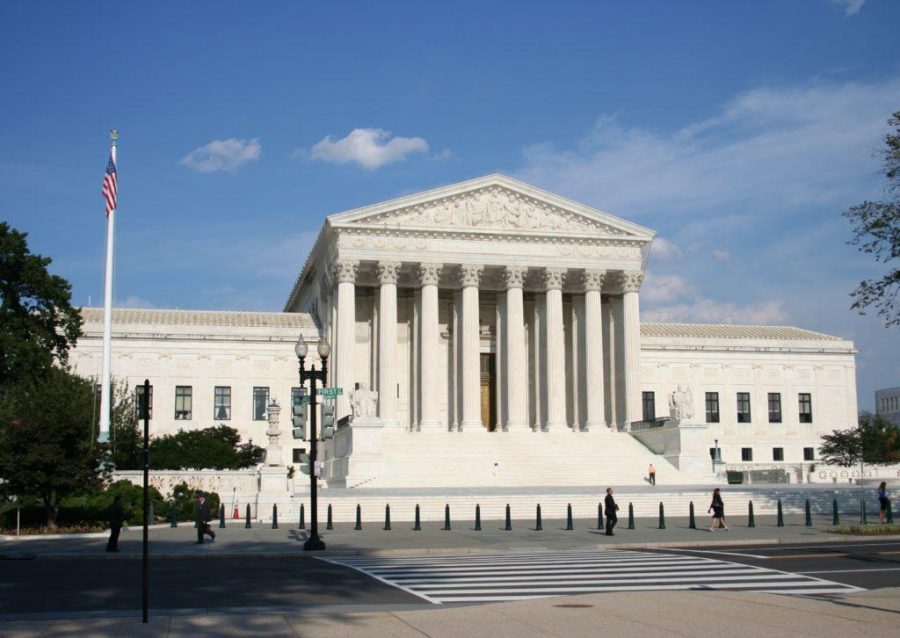Poma: The Supreme Court on Immigration: One Step Forward, Two Steps Backward
July 19, 2020
The Supreme Court recently undertook cases involving the Deferred Action for Childhood Arrivals program and political asylum seekers. On June 18, in opposition to President Donald Trump’s efforts to end DACA, the Supreme Court ruled that they could not do so — at least, for now. The decision felt victorious for many undocumented immigrants, especially with the unrest the community has experienced during the coronavirus pandemic.
On June 25, the Supreme Court quickly shattered the hope that immigrants may find some grace from the Trump administration’s policies with their decision on asylum seekers. Their ruling takes away the ability of rejected asylum seekers to object to their denial of refuge in court. The stark contrast between these decisions shows that we cannot rely on the courts to protect immigrants’ rights. We need drastic policy reform.
The DACA ruling is a short-term win for migrants, but Trump could still rescind the program in the future. An estimated 700,000 Dreamers — childhood immigrants with no papers — meet the requirements for security under DACA. Protection includes worker’s permits, access to education and the opportunity to remain in perhaps the only country they know as “home.” It provides Dreamers opportunities that prior to DACA, were mostly out of reach. When Trump initially repealed the DACA program in September 2017, the two-year renewal applications and new applications were not accepted, until this decision.
Political asylum, on the other hand, grants protection to immigrants who feel endangered if they remain in their home country. In times of conflict, thousands apply for political asylum, but not all are accepted, even if they have a “credible fear” to return.
After detainment near the U.S. Mexico border, Sri Lankan migrant Vijayakumar Thuraissigiam filed for a writ of habeas corpus that would bring him “before the court to determine if [his] imprisonment or detention is lawful” — given his fear of persecution. The Supreme Court ruled that as non-citizens, asylum seekers like Thuraissigiam, who enter the country illegally, have no right to appeal the denial of amnesty. It absolved the US of any obligation to truly protect asylees and ruled that the expedited removal proceedings for such cases are allowed, when they should not be.
These court decisions don’t provide a route to proper citizenship. DACA applicants still must meet stringent guidelines and deadlines to enter the program or renew, and it only serves a small portion of the immigrant population. Political asylum cases require another slough of qualifications. The applicant must be judged by someone who cannot comprehend the fear of being sent back to a hostile environment, thus creating more uncertainty within migrants.
We have relied on the courts for too long, they are only a temporary solution to a problem that the US has ignored and dismissed for far too long. We fail to remember that the 14th Amendment and previous Supreme Court cases emphasize that all people — not just citizens — are entitled rights in this country. We cannot claim to prize the values in the constitution if we fail to properly protect Dreamers, potential asylees and other migrants.
The current nonsensical system needs reevaluation. Currently, bars exist that force undocumented migrants to leave for several years before applying for legal status. Such limitations should be removed and court proceedings should be expedited for the hundreds of thousands of awaiting cases. While we shouldn’t instantly legalize all immigrants, we need to properly assist them. While some migrants enter the US illegally, most have a clear reason for doing so — desperation. Since the current visa process creates uncertainty in terms of wait times, migrants often don’t have another choice – and they shouldn’t be punished severely for trying to protect themselves after this system failed them.
Places like the University of Utah’s Dream Center are good resources for those who know someone or are personally experiencing any repercussions of these decisions. More of these centers should be implemented in schools and cities nationwide to alleviate stigma and open up opportunities for legalization. Not only that, but harsh detention processes and inadequate help for immigrants, for example, must be removed and fixed to further promote a safe and fair path to legalization.
We can’t rely on court rulings, much less the current administration. Even with Trump’s July 10 statement about creating a route to citizenship for DACA recipients, his language is vague, doesn’t promise reform and it totally contradicts his statement that he’ll rescind DACA again. The Supreme Court already ruled that Trump didn’t follow proper protocol to repeal DACA — it’s pretty clear he cannot be trusted with these types of issues. The uncertainty around Trump’s actions further justifies legislative reform and reliable change to the immigration system.
We must recognize our shortcomings as a nation when it comes to not sufficiently protecting our country’s immigrant population. We can’t rely on short-term policies and rulings to decide what’s right and what’s wrong — instead, we need to introduce a broader, more beneficial approach that will not be switched around in a matter of minutes.












